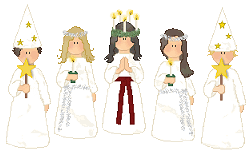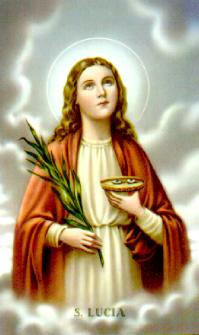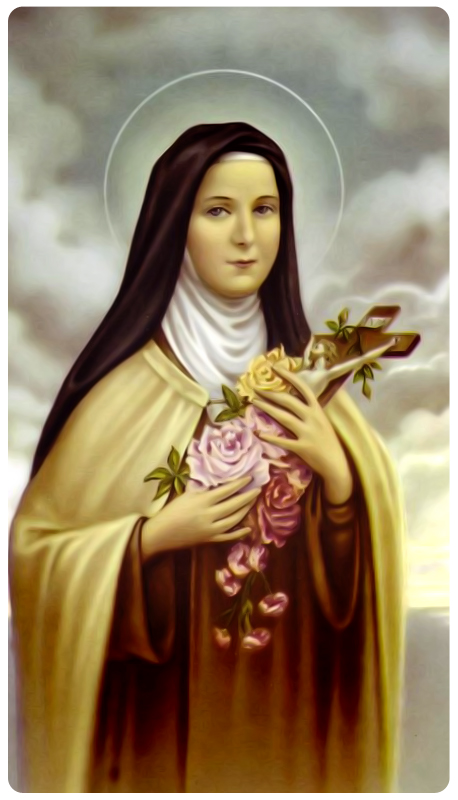Santa Lucia.

Queen of Lights.
The 13:th of December is the day that people in Scandinavia celebrate Lucia.
She
has her name day on the 13:th.
Over the whole country, people arrange processions with
a Lucia, her maids, starboys and small Father Christmases.
But, who was the "real" Lucia?
This day has got its name from
Saint Lucia.
She was a Catholic saint. She was a
young
Christian girl who lived in Syracuse on Sicily.
That was during the time
when Rome was in power.
The
Romans were not Christians yet.
Because Lucia was a Christian,
she got killed on
the 13:th of December in 304
A.D.



|
Santa Lucia sangen.
Nu bæres lyset
frem
Her
ved vor ønskefest plasida é l’onda, / prospero é il vento. Venite all’agile / barchetta mia Santa Lucia, Santa Lucia.
Klart månens stråler |
Song for Santa Lucia.
Nightly, go heavy hearts
Darkness shall fly away |
Santa Lucia sangen. Sankta Lucia,
|

 |
Who was Lucia? 13 December is Luciaday and celebrated with procession in churches and schools around the country. Read the story of a young female martyr who gave her name to the beauty parade - Santa Lucia |
 |

(GOOGLE TRANSLATED)
|
Lucia - Sicilian woman from the 300 figure The story of Lucia starting in year 283 in the town of Syracuse in Sicily. In that year there was born a little girl into a very wealthy family. Prospects for her was good - not only because of the economy - but her family was well regarded, and she could even expect to be well married and have a happy and carefree life. Lucia's life shaped itself in a completely different direction. In a young age, she was vice versa for the religion of the Roman Empire with multiple gods to Christianity and baptism - and this came later cost her life. Fødeøen, Sicily, Lucia was one time part of the Roman Empire. In order to maintain peace in the vast kingdom was ordered residents regularly to sacrifice to the emperor. The problem with the Christian inhabitants were, however, that these consistently refused to make such sacrifices. The Christians want to pray for both the emperor and the kingdom, but to sacrifice to him as a god was completely excluded, because they only accept one god. Christianity was therefore counted as dangerous and an outright enemy of the Roman Empire, and as a consequence of it was prohibited to be Christian. The law was enforced very brutally. If a Christian man was reported to authorities, was the first opportunity to sacrifice for the emperor. But if it refused, it was tortured and later executed - often at a very bestial way. As a result of the ban lived many Christian people, therefore, a secret life where they have either hidden their faith or sought refuge and protection in the urban underground catacombs. Wherever they were, they were totally dependent on being able to rely on their circle of friends and receive help when necessary. Lucia was one of those people who helped. At night she ventured outside, with food for his fellow Christians in the catacombs, and to find their way into the darkness, she had tied a wreath on his head and set light to it. Lucia lived in other words, dangerous life, for she was discovered, she would certainly be sentenced to death. Lucia as a martyr A trip to the neighboring city, Catania, however, have serious implications for Lucia. Her beloved mother was very ill, and to help her, she seeks out the sacred tomb Agathe, where she prays for her mother's healing. At the grave gives Lucia a promise: if the mother is healthy, she will devote her life to Christ and to live in chastity rest of his life. When she subsequently returned to Syracuse, is the mother miraculously been healed, and Lucia welcomes it and also strengthened in his faith by this miracle, and she is now starting to share its wealth to poor people. Following contemporary usage Lucia was promised away to a man. Her family had chosen a non-Christian Roman from a reputable family and therefore in principle the ideal husband for her. But Lucia rejects her husband and marriage. Her faith and her commitment to God is incompatible with marriage. In romerens eyes, her reasoning is not only ridiculous but also downright dangerous to the kingdom's existing, and he took the post of the cruel revenge to set her to the authorities. The declaration is a serious matter for Lucia. Not only is Christianity banned, but the arrest takes place also in the midst of Diocletian's persecution and cleansing of the Christian people. Lucia therefore know the consequences when she does not want to sacrifice to the emperor: she is found guilty. Initially she was punished by being sent to a brothel, but by divine intervention, she will be protected, so the men who would pick her, could not move her. Then she will be tortured and sentenced to death on a pyre. Once again, God does, and she will miraculously not devoured by fire. Eventually ends with the judge to take his sword and put it in her, and Lucia dies, 13 December 304th year Lucia as a saint Lucia is in the same year was buried in his hometown, Syracuse, and already as early as the 400 figure she mentioned in written sources. In the 600 century, when Christianity has long been the state religion of the Roman Empire, one can also find her in the Catholic liturgy. Among the few female saints of the Catholic church at the time celebrated, says Lucia entered. Her feast day is on her death, 13 December, and since her name means light, Lucia is connected not only with light and joy but in fact has become the patron saint of the blind and people with eye diseases. In this context, she is often pictured with a small bowl, which is 2 eyes. In the Catholic Church has a tradition of praying to a saint about to intercede with God for an illness, special hardships and situations. Each saint has his area where he or she helps the believer. After telling several miracles must have occurred by invoking just Lucia. A good example is from 1582 when her hometown, Syracuse, was hit by a terrible famine. Townspeople prayed to their patron saint for help, and at her death, 13 December was their prayers heard. A ship full of grain arrived in the harbor, and all were saved from death. In this context, emerged also a tradition of eating Cuccia. Rather than grind the grain which came with the ship, and grind it into flour and bread that was cooked and eaten as porridge. Every year at Lucia helgendag eat, therefore this day, still this porridge, and both in her hometown, Syracuse, and the places on Earth where Sicilians have emigrated and settled.
Kilde:
|